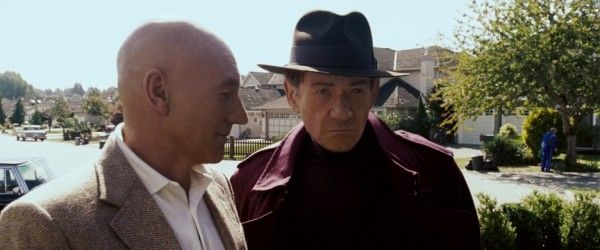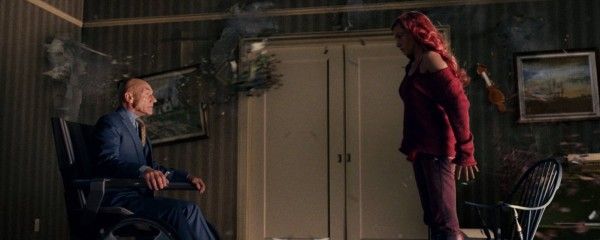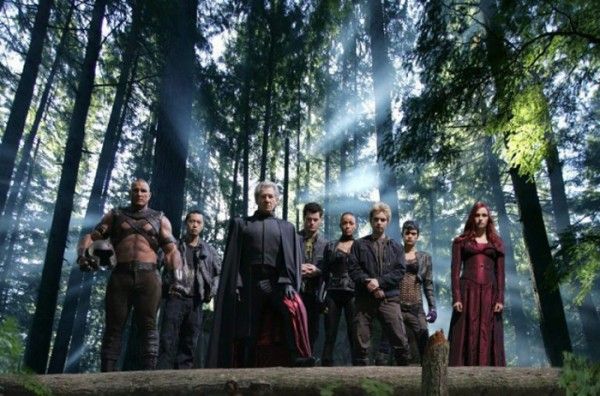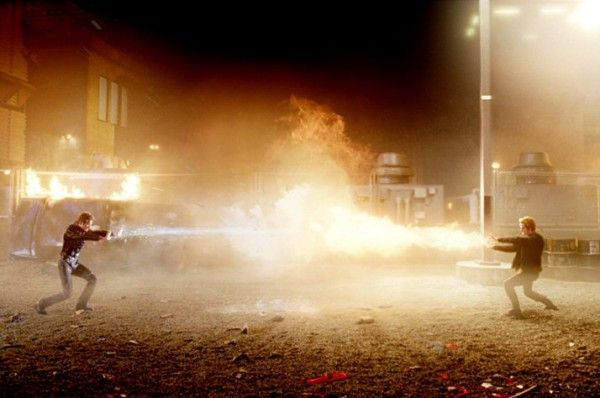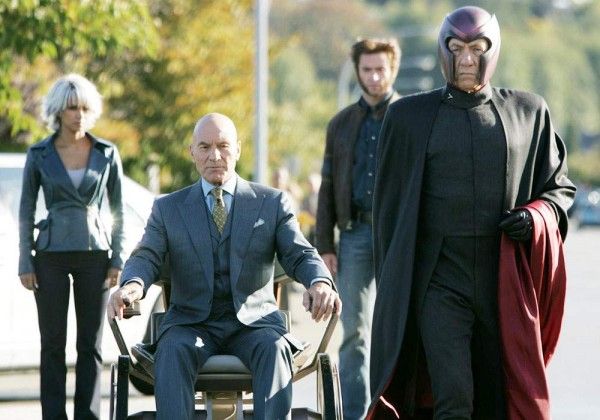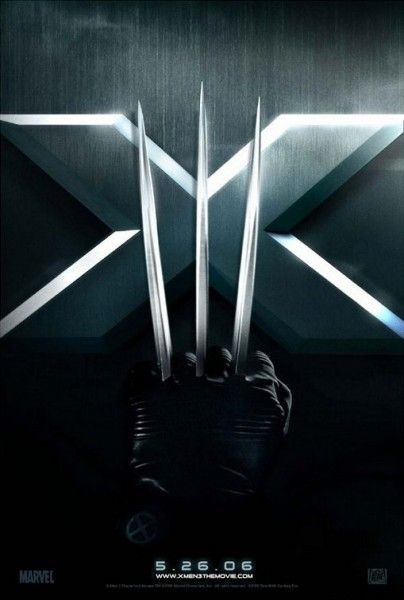[This is a re-post of my retrospective series in which I take a look back at the X-Men movies. These articles do not contain spoilers for X-Men: Apocalypse. If you know any spoilers about X-Men: Apocalypse, please do not post them in the comments section.]
Even if Bryan Singer had returned to direct the third X-Men movie, X2 would have been a tough act to follow. However, he hinted at a clear path forward, or at least enough of a hint that it allowed fans to imagine what could have been. When Singer decided to direct Superman Returns instead, he left a sequel in limbo. Fox was going to move forward with or without him, and it was a bumpy road just to put someone in the director's chair let alone find a way to get the right script. Even with these issues, X-Men: The Last Stand isn't a disaster. If X2 didn't exist and this was the direct sequel to 2000's X-Men, it would be on par. But X2 raised expectations, and in The Last Stand's attempt to pursue two potentially great plotlines, it reduces the impact of both.
The movie starts with a digitally de-aged Charles Xavier (Patrick Stewart) and Magneto (Ian McKellen) visiting a young Jean Grey (Haley Ramm), and discovering she's basically a Damian child. Then we get another prologue where a young Warren Worthington III (Cayden Boyd) is trying to saw his wings off. When your movie has two prologues highlighting two different characters who never interact with each other over the course of the movie, you may want to rethink your plot. The beginning of X-Men: The Last Stand is a big warning sign that we're going to be pursuing two storylines: "The Dark Phoenix Saga" and "Gifted", the latter of which is about the mutant "cure", which permanently removes a mutant's powers.
Either one of these stories could have made a terrific movie on its own. The "cure" plotline is still the driving force for most of the movie. However, the execution is painfully clumsy because it's so awkwardly paced due in part to the Dark Phoenix distractions. Even with Jean out of the picture, you have a storyline where it feels like the movie was eviscerated in the edit. Angel is a cameo-plus sized role, and Rogue's consideration of the cure is given almost no time to breathe. A lot happens in The Last Stand, and most of it lacks weight.
It feels like all of the emotional heft was put on Dark Phoenix and then The Cure was meant to supply the plot, and stories shouldn't work that way. You don't use a subplot—between the two, that's what Dark Phoenix is—as a handbag for emotions. They have to be integrated into the larger story because if they're relegated to a supporting role, then their significance is diminished. When Cyclops (James Marsden) dies, that should be a huge deal. It should shake all of the X-Men to their core. Their friend and leader has been murdered by his wife. Instead we get a clumsy explanation of how Jean (Famke Janssen) actually had a split personality because Professor X invaded her mind and implanted mental barriers.
The moral dubiousness of Xavier's actions actually provides a new perspective on the Professor X to go to a new, morally dubious place where he's angry, on the defensive, and uncertain of his actions. Additionally, putting in these barriers raises the question of "Who is the real Jean Grey?" Was there ever a good person deep down, or was that just a product of Xavier meddling with her mind? While I was never a fan of the Damian-child Jean and thought that the second-mutation was pretty clearly laid out in the conclusion of X2, this approach to the Dark Phoenix could have provided some fascinating character exploration. Naturally, they don't build on it because we have to rush back to the cure.
The only bridge between the cure and Dark Phoenix is a loose theme regarding control versus choice. It may be safer for everyone if Jean is kept under control, but it removes her ability to choose. The cure may be safer for humanity, but when it's put into guns, it removes mutants' ability to choose. From Magneto's side, he's still controlling Jean and he's removing the choice from mutants like Rogue (Anna Paquin) who want the cure. It's a difficult conundrum, but the plot is so schizophrenic that it can't build this theme into anything coherent.
Brief flashes of a better movie keep flickering throughout X-Men: The Last Stand beyond the unrealized greatness of the two plotlines. When Jean is lying on the examination table and Logan (Hugh Jackman) is watching over her, it's a nice visual callback and illustrates how the roles of the domestic/feral personalities have switched. Then the moment is obliterated by having Jean announce that their roles have reversed. Another scene loaded with potential is when the team is pinned down and sees a cartridge of syringes filled with the cure. For a moment, it looks like they're considering the ethics of using a weapon that would remove a fellow mutant's power. Then you realize they're just formulating a plan on how to use it against Magneto, and the ethical ramifications never entered their minds.
While it's easy to lay all of the blame at the feet of director Brett Ratner, it's not entirely fair to do so in this case. X-Men: The Last Stand lost the director it should have had because Singer found another comic book movie he wanted more. Screenplays were scrambled, plotlines were altered, and while all of this isn't unusual for blockbusters, the real hit to The Last Stand was Matthew Vaughn departing before filming was about to begin. While the reasons behind his departure could be chalked up to family issues and studio meddling, the fact remains that Ratner was brought into a picture that was already in pre-production. He was under a tight deadline, and Fox knew he was competent enough to meet the release date and his personality wouldn't rock the boat.
Fox hired Ratner to get a competently made blockbuster, and that's all they got. The flash and style present in X2 was erased, and The Last Stand is more in line with the featureless X-Men. Even the plot and set pieces are similar to the first movie. The Last Stand doesn't have a lot of action beyond a fight inside a house, Wolverine fighting no-name mutants in a forest, and the climactic battle at Alcatraz, which is really just a bigger version of the climax of X-Men: mutants vs. mutants at an American landmark. The movie doesn't take any chances, so it's not unsurprising that it retreads familiar ground.
Where The Last Stand goes from frustrating to infuriating is where it becomes smug about how daring it thinks it is. As I said earlier, Cyclops' death is a bit surprising, but the emotional impact is botched because of the pacing and execution (also, if you know the behind-the-scenes machinations, then you know he's being killed off not because it's best for the narrative, but because it's best for Marsden going off to shoot Superman Returns). But where the movie really wants to shock the audience is by "killing" Professor X and "removing" Magneto's powers.
These are the two characters who open the movie and they have been the core of the trilogy's overarching conflict. Wolverine may sell more toys, get more quips, and have more fans, but Xavier and Magneto are the pillars of the franchise. If The Last Stand were truly daring, it would have stuck to its guns about the harsh conclusions for Xavier and Magneto. Instead, it concludes by slinking back to the status quo. The awkwardly placed scene where Xavier talks to his students about ethics doesn't really relate to the larger plot; it's to set up the stinger about his resurrection. As for Magneto losing his powers, that should be a fitting conclusion to the character's arc. That's a fate worse than death for him. But the final moment of the film shows Magneto's powers aren't truly gone. Additionally, for this little scene to happen, you have to assume that the most wanted terrorist on the planet can go out in public and play chess in the park on a bright, sunny day.
X-Men: The Last Stand is a "franchise installment" in the worst meaning of the phrase. It keeps the franchise going through its presence alone. The movie's highest aspiration is "adequate" and that's pretty much what everyone brought to the table. Having the "fastball special", Kitty Pryde (Ellen Page) as a main character, and giving Storm (Halle Berry) a more proactive role are what count as the film's major achievements. All that's truly memorable about X-Men: The Last Stand is how much potential it wastes. But as we would see, an X-Men movie could be so much worse.
Rating: C
[Tomorrow: X-Men Origins: Wolverine]
Other Entries:


